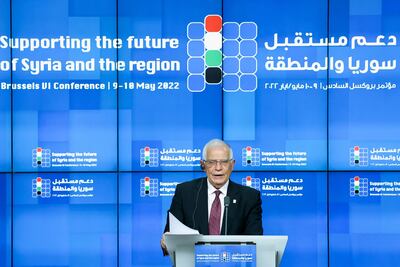Live updates: follow the latest news on Russia-Ukraine
About $6.7 billion has been pledged at an international donor conference to support Syria and its neighbours despite what the EU's foreign policy chief described as “a certain fatigue” with the conflict there.
The pledges, which go a long way in reaching a UN target of $10.5 billion for 2022, were made at a gathering of 55 countries in Brussels on Tuesday.
Russia was excluded from the gathering because of its invasion of Ukraine.
Of the total pledged, $6.1 billion is for refugees, asylum seekers and stateless people, the largest budget request since the refugee plan began in 2015, Reuters reported.
Josep Borrell, the European Union’s top foreign policy official, said there were seven million such refugees, compared with the 5.9 million who have fled the war in Ukraine, placing a “heavy burden” on neighbouring countries.
“Syria and the suffering of its people might not be [at] the centre of the news any more,” said Mr Borrell. “There is a certain fatigue after 11 years. But it remains in our minds.”
The EU said it would offer €1.56 billion ($1.64bn) this year, and the same amount again in 2023, for Syrians in their home country and for refugees.
Mr Borrell urged diplomats from countries attending the conference to be “equally generous”.
Washington's ambassador to the UN, Linda Thomas-Greenfield, said the food crisis resulting from the war between Russia and Ukraine — two of the world’s top wheat producers — was exacerbating the situation in Syria.
She said cooking oil prices had jumped by 39 per cent in Syria in the 11 weeks since Russia invaded Ukraine, worsening the crisis for people in Syria.
Diplomats heard that 90 per cent of Syrians still in their country are living in poverty and more than half suffer from food insecurity.
The UN children’s fund, Unicef, said necessities for young people such as sanitation, education and nutrition had been “cut to the bone” in a conflict it described as having set back Syria’s development by 25 years.
About a third of children in Syria are chronically malnourished, Unicef chief Catherine Russell told diplomats, with young refugees also growing up in circumstances “riddled with loss, risk and uncertainty”.
“The impact of the war in Ukraine on food prices is making a bad situation even worse,” she said. “These are dangerous, even deadly, times to be a child in Syria.”
Describing the plight of Syrians in Jordan, Ms Thomas-Greenfield recounted hearing from refugees in Jordan that it would be “impossible to return home” until the humanitarian situation improved in Syria.

“To me, their testimony is a demonstration of just how dire the situation is right now for the Syrian people,” she said in her remarks to the conference.
Ms Thomas-Greenfield pledged $800 million on behalf of the US.
Other donors included Britain, which offered £158m ($195m) in aid to support food production, women and girls, aid deliveries and Syria’s north-east region. Norway said it would provide 155 million kroner ($16m) this year.
The UN Security Council will be asked in July to extend the use of a border crossing between Syria and Turkey to deliver humanitarian aid which Ms Thomas-Greenfield said was a matter of life and death.
But western countries have laid much of the blame for the crisis at President Bashar Al Assad’s door and said they would not fund Syria’s reconstruction until efforts towards a diplomatic solution make progress.
Mr Borrell said such funding would only become available if warring parties show a readiness to compromise and commit to political reform.
“A comprehensive political solution brokered through the United Nations is the ultimate imperative,” he said.
“Until the process has been fulfilled, the Syrian people will not be forgotten by us, whatever other events require our attention.”













